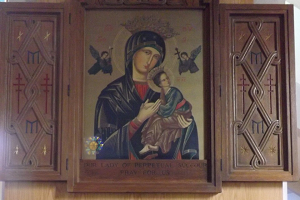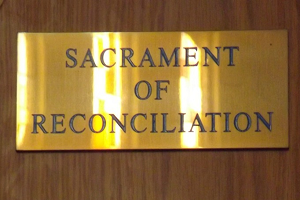


Reconciliation (also called Confession or the Sacrament of Forgiveness) is the sacrament in which the sinner receives complete forgiveness from God for his or her sins through the words of the priest (absolution). Today many people would seem to be put off by the sacrament of reconciliation. But it is a wonderful means to receive God’s grace – the assurance of his presence and continuous mercy for us and the strength to continue on the paths of holiness. There is no need to be fearful of this great sacrament, for in it a special encounter takes place that heals the soul of all past wrongs.
Why confess sins to a priest? It is quite possible of course to pray in sorrow to God “directly” for one’s sins. Indeed this is necessary, because it fosters an attitude of compunction, or the revulsion of one’s past deeds. Yet such prayer, even if said alone, always takes place in the context of the Church, the mystical body of Christ, since it is in and through the Church that Christ communicates with us. And Our Lord also instituted the sacraments for the Church to show just how close he is. As signs that bring us his actual presence among us, his saving grace, they are the means he gave to the Church for her members to become partakers in the divine life.
As a minister of the Church, the priest is a mediator between God and his people, administering sacramental grace through the sacraments. This is sanctifying grace that “fits us for heaven”, as the carol “Away in a manger” puts it.
There are four key moments in the sacrament of reconciliation: Contrition (sorrow for sins) Confession (an honest and straightforward account of sins committed since one’s last confession) Absolution (the prayer given by the priest, which absolves (forgives) the penitent of sins confessed) Satisfaction (penance – as a means of restoring the justice owed to God that is lost through sin; it usually takes the form of prayer or an act of reparation).
What needs to be confessed? All mortal sins committed since one’s last confession must be confessed. A mortal sin is a sin that gravely offends against God. It is also good to confess venial sins, which might be considered less serious, but which still stain the soul. Here is an examination of conscience that might act as an aid to preparing yourself for this sacrament.
Have great confidence in the sacrament of reconciliation, especially if you have not been for a while. You will receive great encouragement from the priest, who is always happy to hear your confession.
Schedule
The Sacrament of Reconciliation is available at Our Lady & St Christopher’s on Saturdays from 5.45 – 6.20pm, on Sundays from 10.20-10.50 or by appointment with one of the priests.
There are also special reconciliation services during Advent and Lent with several priests available for this sacrament.
Get In Touch
Please do not be afraid to ask to go to Confession. The priest will always make this important Sacrament available.
